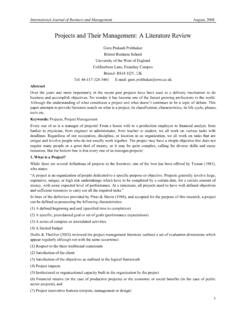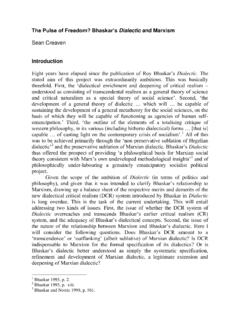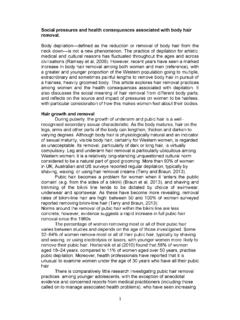Transcription of Teaching thematic analysis: Overcoming challenges and ...
1 Clarke, V. and Braun, V. (2013) Teaching thematic analysis : Over-coming challenges and developing strategies for effective Psychologist, 26 (2). pp. 120-123. ISSN 0952-8229 Availablefrom: recommend you cite the published publisher s URL is: : Yes(no note)DisclaimerUWE has obtained warranties from all depositors as to their title in the materialdeposited and as to their right to deposit such makes no representation or warranties of commercial utility, title, or fit-ness for a particular purpose or any other warranty, expressor implied in respectof any material makes no representation that the use of the materials will not infringeany patent, copyright.
2 Trademark or other property or proprietary accepts no liability for any infringement of intellectual property rightsin any material deposited but will remove such material frompublic view pend-ing investigation in the event of an allegation of any such SCROLL DOWN FOR thematic analysis : Overcoming challenges and developing strategies for effective learning Victoria Clarke & Virginia Braun Victoria Clarke Associate Professor in Sexuality Studies Department of Psychology Faculty of Health and Life Sciences University of the West of England Coldharbour Lane Bristol BS16 1QY Virginia Braun Senior Lecturer Department of Psychology The University of Auckland Private Bag 92019 Auckland 1142 New Zealand Teaching thematic analysis .
3 Overcoming challenges and developing strategies for effective learning With qualitative research methods an integral part of the psychology curriculum, questions arise of what approaches to teach, and how to teach them. We think thematic analysis (TA) offers a useful and a relatively easy to teach and learn basic introduction to qualitative analysis (see Braun & Clarke, 2006; 2012, 2013; Clarke & Braun, 2013); yet even Teaching a fairly accessible approach like TA presents challenges in the classroom. Drawing on our experiences, and 38 responses from psychology students to a short qualitative survey on students experiences of qualitative and TA Teaching , we explore some of the challenges of Teaching TA to students new to qualitative research, and suggest strategies for Overcoming these.
4 Many of these are not specific to TA; they apply to Teaching qualitative research more broadly, but we focus our discussion on TA. What is thematic analysis ? Despite widespread use, TA has only recently started to achieve the brand recognition held by methodologies such as grounded theory and interpretative phenomenological analysis (IPA). TA is essentially a method for identifying and analysing patterns in qualitative data. Since first being named as an approach in the 1970s (Merton, 1975), a number of different versions of thematic analysis have been proposed within psychology ( , Aronson, 1994, Attride-Stirling, 2001, Boyatzis, 1998, Joffe & Yardley, 2004, Tuckett, 2005), including our own (Braun & Clarke, 2006).
5 Some authors demarcate TA as a phenomenological method ( , Guest, MacQueen & Namey, 2012, Joffe, 2011); we, in contrast, emphasise the theoretical flexibility of TA, and identify it as just an analytic method, rather than a methodology, which most other qualitative approaches are. We view TA as theoretically flexible because the search for, and examination of, patterning across language does not require adherence to any particular theory of language, or explanatory meaning framework for human beings, experiences or practices.
6 This means TA can be applied within a range of theoretical frameworks, from essentialist to constructionist; thematic discourse analysis (see Taylor & Ussher, 2001) is even possible. This theoretical independence means TA can be learned without some of the potentially bewildering (for new students) theoretical knowledge essential to many other qualitative approaches. TA is suited to a wide range of research interests and theoretical perspectives, and is useful as a basic method because: a) it works with a wide range of research questions, from those about people s experiences or understandings to those about the representation and construction of particular phenomena in particular contexts; b) it can be used to analyse different types of data, from secondary sources such as media to transcripts of focus groups or interviews.
7 C) it works with large or small data-sets; and d) it can be applied to produce data-driven or theory-driven analyses. Six phases of thematic analysis (Braun & Clarke, 2006) This should not be viewed as a linear model, where one cannot proceed to the next phase without completing the prior phase (correctly); rather analysis is a recursive process. 1) Familiarisation with the data: is common to all forms of qualitative analysis the researcher must immerse themselves in, and become intimately familar with, their data; reading and re-reading the data (and listening to audio-recorded data at least once, if relevant) and noting any initial analytic observations.
8 2) Coding: Also a common element of many approaches to qualitative analysis (see Braun & Clarke, 2012a, for thorough comparison), this involves generating pithy labels for important features of the data of relevance to the (broad) research question guiding the analysis . Coding is not simply a method of data reduction, it is also an analytic process, so codes capture both a semantic and conceptual reading of the data. The researcher codes every data item and ends this phase by collating all their codes and relevant data extracts.
9 3) Searching for themes: A theme is a coherent and meaningful pattern in the data relevant to the research question. If codes are the bricks and tiles in a brick and tile house, then themes are the walls and roof panels. Searching for themes is a bit like coding your codes to identify similarity in the data. This searching is an active process; themes are not hidden in the data waiting to be discovered by the intreprid researcher, rather the researcher constructs themes. The researcher ends this phase by collating all the coded data relevant to each theme.
10 4) Reviewing themes: Involves checking that the themes work in relation to both the coded extracts and the full data-set. The researcher should reflect on whether the themes tell a convincing and compelling story about the data, and begin to define the nature of each individual theme, and the relationship between the themes. It may be necessary to collapse two themes together or to split a theme into two or more themes, or to discard the candidate themes altogether and begin again the process of theme development.



